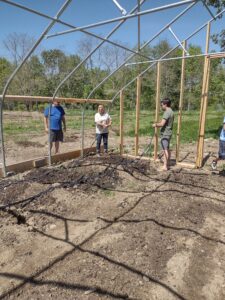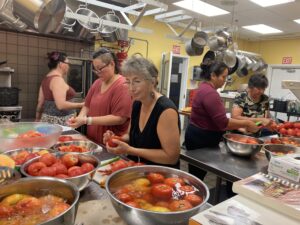Final report for ENE21-173
Project Information
Tribal Nations in the Northeast have established farms to increase food sovereignty and knowledge of sustainable agriculture among their citizens, making the farm staff primary agriculture service providers among their farming communities. Due to historically oppressive land, resource, and cultural policies, Tribal Nations who have practiced sustainable and regenerative agriculture on this continent for millenia have experienced severe agricultural knowledge transmission disruption. This project aims to protect and promote traditional agricultural knowledge and braid contemporary sustainable agriculture approaches together while mending relationships between Western and Indigenous institutions. Four Tribal Nations participated as Agriculture Service Providers, including Penobscot Indian Nation, Saint Regis Mohawk Tribe, Seneca Nation of Indians, and Shinnecock Indian Nation. Partner Key Individuals included staff from Cornell University Extension and Maine Organic Farmers and Gardeners Association.
Each activity was intentionally designed to provide opportunities for cultural and agricultural knowledge exchange between Tribal Nations and the project partners from land grant university extension offices and non-profit organizations. United South and Eastern Tribes led the project, organizing Cultural Workshops featuring Tribal food sovereignty experts that shared historical and contemporary context on Tribal agriculture for the benefit of partner organization staff. The theme of cultural exchange was further developed during the Train-the-Trainer Workshop series which was developed collaboratively between Tribal Nations and partner organizations. Partner organizations provided Adult Education Workshop to Tribal ASPs, and Tribal Nations provided guidance on adapting existing training materials and language and modifying feedback approaches for Tribal audiences. The result was a bending away from written materials to more hands-on and interactive workshops with discussion-based feedback. Train-the-Trainer topics included garden planning, cover crops with heirloom corn varieties, irrigation, food preservation, orchard care, and bee keeping. The Train-the-Trainer series offered multi-directional learning between Tribal farms and partner organizations. Partner organizations gained insights into Tribal agricultural history and contemporary practices and perspectives, placing them in a position to lead and contribute to institutional initiatives to improve outreach and relationships with Tribal Nations. In turn, Tribal Nation farm staff gained insights into teaching adults, organizing and hosting workshops, gathering feedback before, during, and after events, and greater familiarity and comfort accessing institutional resources and staff.
Seven Community Workshops were held the day after Train-the-Trainer Workshops to promote "learning by doing" among Tribal farm staff who instructed community members with the support of partner organizations. 74 farmers attended the workshops over the course of the project. 36 farmers reported integrating the topics into their farms during the project: seven farmers implemented cover cropping practices into their farms, ten implemented drip irrigation systems, 17 implemented farm planning and food preservation strategies, and five implemented beekeeping or orchard management practices.
Saint Regis Mohawk Tribe (SRMT) farm staff reported feeling much more confident with on-farm community outreach and education. SRMT has leveraged the relationships and skills built as a result of this project into a community outreach program and established a community garden space with raised beds at waist level to cater to elders. Eleven Tribal farmers participated in their community garden program during 2024 and learned to grow a variety of traditional and contemporary crops. The program is expanding in 2025 with an equipment loan program so farmers can learn how to operate equipment at the St. Regis Mohawk Tribe's farm and bring it home to apply on their own farms. This project is currently funded and set to continue for the next two years.
17 Tribal farm staff will participate in train-the-trainer workshops and expand their capacity as agriculture service providers by developing culturally-relevant curricula on five topics (soil health, raised beds, planting plans, composting, and canning) and delivering 36 workshops to 150 subsistence and direct-market farmers in six Tribal Nations. 40 of these farmers will begin or expand a sustainable agriculture project as a result of attending an agricultural service provider-instructed community class.
Indigenous farming is undergoing a revolution in the Northeast calling for innovation in technical assistance delivery to Tribal Nation citizens. Seven Tribal Nations identified the need to train their agriculture or outreach staff in sustainable agriculture topics in order to provide in-house assistance. This project trained Tribal Nation staff with culturally-relevant curriculum and supported them in delivering workshops to farmers in their communities.
Description of Problem or Opportunity
The 150 Tribal farmers who benefitted from this project typically operate small farms of 10 acres or less for subsistence and ceremonial purposes. The 2017 Agriculture Census counted just 163 producers as Native American in New York and Maine. However, in just one round of surveys, project partners received 150 Tribal farmers responses, demonstrating the need for beginning farmer training for Maine and New York Tribes on topic areas requested in the survey.
This point also illustrates that Tribal farmers are vastly undercounted by the Ag Census. As farmers who don’t fit the conventional notion of farming despite being this continent's first agriculturalists, Tribal farmers typically do not participate in USDA programs or interact with Extension services. Instead, Tribal farmers turn to their peers and resources within their Tribal Nations.
Fortunately, Tribal leaders had the foresight to lay the groundwork for in-house agriculture service to their citizens. In the past five years, several Tribal Nations in the Northeast have established agricultural enterprises that incorporate modern and traditional production, harvest, and storage approaches with the goal of building food sovereignty. Food sovereignty from an indigenous perspective focuses on developing holistic food systems that serve to synchronously improve the health of Mother Earth and ukwehu:wé (“The Original People”). To that end, Tribal food sovereignty programs have the potential to serve as a hub of not only healthy, indigenous foods but also indigenous knowledge and sustainable agriculture technical assistance.
The primary opportunity in this case was within Tribal farm enterprises, of which seven indicated their need for staff training to expand capacity as agriculture service providers (ASPs). The three in New York are: Seneca Nation of Indians’ Gakwi:yo:h Farms, St. Regis Mohawk Tribe’s Agriculture Department, and Shinnecock Indian Tribe’s Natural Resources Department. Penobscot Indian Nation in Maine also participated. Directors identified staff to participate in this project’s TTT process and expand their capacity as ASPs, utilizing their farms and gardens as demonstration sites to conduct sustainable agriculture workshops for local farmers. Collectively, ASPs and Tribal farmers improved farm productivity, increased food sovereignty, healed soil and water, strengthened cultural traditions, and built collaborative relationships with external partners.
Solution and Benefits
United South and Eastern Tribes (USET) designed the project to ensure new knowledge, skills, and attitudes are gained through reciprocity between Tribal Nations and Key Individuals (KIs) from USET, Cornell Extension, and Maine Organic Farmers and Gardeners Association (MOFGA).
At the onset of the project, KIs attended a Cultural Awareness webinar series to provide insights into Tribal agriculture, set cultural protocols, and set the tone of reciprocal learning. As agriculture service providers themselves, KIs came away with an improved understanding of Tribal Nations and agriculture which will serve them for years to come within their institutions and during outreach initiatives.
Tribal farm staff co-developed TTT and Community Workshop curriculum with KIs and gained knowledge of technical agriculture content through hands-on train-the-trainer workshops, utilizing their farms as demonstration sites. As they learned, farm staff gained the confidence to deliver workshops, honing their skills through practice lessons delivered between Tribal farm staff peers. Short evaluations after each learning module provided feedback to Tribal staff and KIs on areas to improve the curriculum. Workshop topics were chosen to align with the needs of Tribal farmers and Tribal farm partners: Planting planning, Cover Crops, Food Preservation, Orchard Care, and Bee Keeping. Directly following TTT, ASPs delivered workshops to Tribal farmers with the support of KIs. This resulted in culturally-relevant technical assistance being made available to beginning Tribal farmers. This process also built skills and relationships to ensure ongoing development of curriculum as the needs of the Tribal farms and farming community evolve over time. KIs also continually gleaned cultural competency to apply within institutional initiatives and improve their outreach to Tribal farmers.
Successful workshop delivery goes beyond technical knowledge, so Tribal farm staff also learned adult learning, event marketing, and evaluation subject matter. These skills further built confidence and helped ensure continual improvement in workshop delivery content, format, and execution beyond the timeline of this project. KIs worked to ensure the farm staff had all the tools they need to hit each milestone in this project and future projects to come as established ASPs.
Cooperators
- (Educator)
- (Educator)
- (Educator)
- (Educator)
- (Educator)
- (Educator)
Educational approach
Cultural Awareness Training (January 2022): Two Tribal food sovereignty experts trained KIs on Cultural Awareness through a webinar series, touching on historical Tribal agriculture, cultural approaches to agriculture, and the contemporary approaches to integrating traditional practices into agricultural enterprises.
Adult Learning Workshop (April 2022): To ensure KIs and Tribal staff have the same skill set for training adults, Elizabeth Buck lead an adult learning webinar. KIs and ASPs shared their preferred learning styles, discussed evaluation tools, and considered adapting evaluation and engagement tools for Tribal audiences.
Train the Trainer (TTT) Workshops (2024/2024): KIs delivered the training to Tribal staff on-site and in accordance with farm schedules. Each topic was taught with hands-on methods using the previously developed curriculum and adult learning subject matter. The approach was adapted to convene all Tribal farm staff on one farm for each TTT Workshop to promote inter-Tribal knowledge exchange. During these trainings, Tribal ASPs provided feedback and guidance on adapting the training materials for Tribal audiences. Training topics were as follows:
- Farm/garden planning
- Cover cropping with Indigenous crops
- Irrigation
- Food preservation
- Orchard care
- Bee keeping
TTT Evaluation (2022-2024): KIs and Tribal staff discussed successful marketing and evaluation methods and strategies directly following the TTT workshops.
Community Workshops (2022-2024): The day following TTT, ASPs delivered workshop content to their communities on their Tribal farms with assistance from KIs. ASPs implemented marketing, workshop hosting, and evaluation practices gained during TTT events.
Community Workshops Evaluation (2022-2024): ASPs and KIs met virtually after each TTT/Community Workshop event to gather feedback and iterate improvements for the next event.
Final Evaluation (2024): ASPs and KIs met virtually to review the project and glean outcomes and feedback.
Click here to see a Workshop Summary for this project.
Milestones
Each KI learns Tribal history, agriculture, and protocols through a Cultural Awareness webinar series led by elders from Seneca Nation, St. Regis Mohawk Tribe, Shinnecock Tribe, and Aroostook Band of Micmacs. KIs improve awareness of Tribal Nations, commit to an attitude of reciprocal learning, and gain Tribal protocol awareness.
6
4
8
January 28, 2022
Completed
January 28, 2022
A virtual two-hour meeting was held with speakers from two Tribal Nations, Pete Jemison (Seneca) and Tony Sutton (Passamaquoddy), offering historical and present-day insights into the interplay between agriculture and cultural identity for their Tribal Nations.
Cultural awareness is occurring naturally as part of the Train-the-Trainer and Community Workshop series. Five KIs who attended the Food Preservation & Garden Planning TTT series said they gained insights into traditional foods, preparation methods, and cultural meaning of these aspects.
Cultural trainings are planned for 2024. Cultural awareness gained through this project has broader reaching impact as KIs carry out their duties. For example, Elizabeth Buck was asked to sit on a Cornell Extension leadership team of 20 people to attend 4-5 workshops on Restoring Relationships to improve outreach and assistance to Tribal Nation farms and farmers. She noted she'll use insights gained through this project towards the leadership team's goals.
Six KIs and 15 ASPs (12 committed and estimated 5 additional) gain skills in Adult Learning through a virtual training which will cover identifying an audience, setting learning outcomes, teaching methods and tools, and evaluation techniques.
23
25
February 26, 2022
Completed
April 29, 2022
An Adult Learning Workshop took place in April 2022 to cover adult learning topics with target ASP's. Four Tribal Nations attended: Penobscot Nation, Shinnecock Nation, Seneca Nation, and St. Regis Mohawk Tribe. Partner KI's included four staff from Cornell Extension.
Adult Learning concepts continue to be integrated into TTT and Community Workshops. For example, KI and ASP trainers have begun distributing red, yellow, and green note cards to participants and using planned check-ins to gauge the comfort level of participants with new materials.
15 ASPs learn how to find educational tools offered by Extension and other partners by participating in curriculum committees with six KIs. While in committee they combine educational tools with traditional ecological knowledge to develop culturally-relevant curricula for each topic along with evaluation forms. ASPs learn the subject matter and curriculum development skills and KIs gain more cultural awareness.
23
8
September 30, 2022
Completed
November 25, 2024
Due to staffing shortages at Tribal Farms, this milestone's activities were condensed into the Train-the-Trainer events. At the Cover Crops & Crop Rotations Workshop, Elizabeth Buck (Cornell) worked with Gerry Fisher (Gakwi:yo:h Farms) to adjust existing curricula so it would be more relevant for Tuscarora White Corn, a variety commonly grown in Gerry's community.
It's important to note that even though new curriculum wasn't developed, after two years of TTTs, KIs have a sounder understanding of Tribal crops and their value across the three pillars of sustainability and ASPs have developed closer working relationships with KIs and have clearer channels of communication to modify and adapt curriculum concepts to their Tribal community audiences. Tribal ASPs have requested technical assistance on topics related to on-farm sustainability beyond the scope of the project, and KIs have made site visits and offered technical assistance as requested. This signals that Tribal ASPs are more comfortable accessing local sustainable agriculture technical assistance and are more familiar with services offered by University Extension and non-profit organizations.
KIs reported in 2025 that this project deepened their understanding of Tribal agriculture. The opportunity to travel to Tribal farms and spend 2-3 days on site with Haudenosaunee and Wabanaki Tribal Nation citizens and staff brought valuable insights that will serve them going forward. In fact, Elizabeth Buck has already been tapped to develop curriculum for Cornell Cooperative Extension staff regarding providing technical assistance to Tribal Nations as a direct result of her experience gained during this project.
TTT workshops train ASPs to deliver the content they helped create. Soil health will cover comprehensive soil testing, amendments, and cover crops. Composting will cover building and maintaining a compost bin, vermicomposting, and compost applications. Raised beds will cover building and maintaining a raised bed. Canning will cover high and low acid canning methods and value-added subject matter. Planting planning will cover the timeline and layout of farms and gardens. Workshop schedule will be staggered across two years.
17
25
December 16, 2022
Completed
November 25, 2024
2024: Train-the-Trainer events concluded with an Orchard & Bee Keeping workshop held at Penobscot Nation in Maine. Staff from Seneca Nation and St. Regis Mohawk Tribe attended the workshop, coordinated by Tami Connolly of Penobscot Indian Nation Agriculture Program, David Anderson of USET, and Ryan Dennett of Maine Organic Farmers and Gardeners Association. Participants learned how to plant and manage orchard trees, establish a bee colony, and care for bees. A concluding virtual workshop also took place in November 2024 to recap and review all topics covered and provide an opportunity for further inter-Tribal knowledge sharing and relationship building.
2023: Train-the-Trainer events continued and included Irrigation; Food Preservation; and Garden Planning. The irrigation workshop included water sources, pumps, materials, assembly, and troubleshooting aspects. Food Preservation discussed traditional and modern approaches to preserving white corn, squash, and apples. This topic was tied to Garden Planning with the through line of expected yield, which impacts planning for the next season.
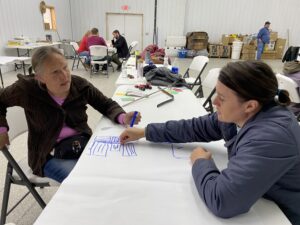
After the Adult Learning Workshop, Tribal Nation participants joined other Tribal farmers at Onondaga Nation's Seed Bee, which included a training on seed cleaning and storage for heirloom corn varieties held April 30th, 2o22. More than 50 farmers attended the workshop and learned how to identify threats to seed health and create safe conditions for long term seed storage. On September 14th, 2022, Elizabeth Buck delivered a Train-the-Trainer workshop for Seneca Nation's farm, Gakwi:yo:h Farms, regarding cover cropping and crop rotations specifically for heirloom corn varieties. On September 16th, Gakwi:yo:h Farms' staff delivered the content to four Tribal Farmers with the support of Elizabeth Buck and Lea Zeise.
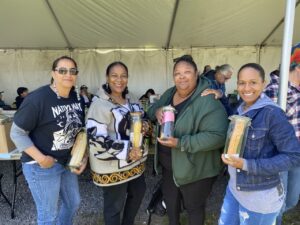
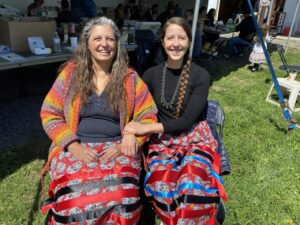
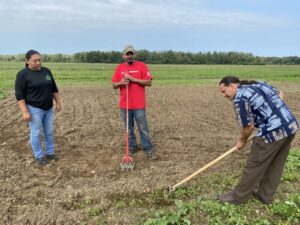
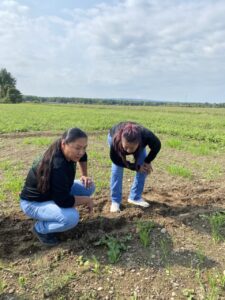
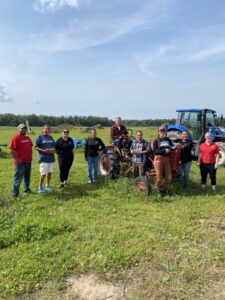
3 ASP's and 5 farmers attended a Pollinator Camp at Mi'kmaq Farms supported by Mariam Taleb of MOFGA and Xerces. The three Mi'kmaq farm staff were trained and delivered content to 5 farmers from Mi'kmaq Nation. The event was open to families, so children were also present to learn about pollinator habitats, common pollinators, and how pollinators improve farm productivity and support ecosystem health.
ASPs learn marketing skills and hone curricula development skills by participating in the TTT Evaluation Phase and Community Workshop Curricula Development Phase. ASPs practice educational and marketing techniques, and KIs will gain insights into marketing to Tribal communities and culturally-appropriate programming techniques from ASPs.
23
14
25
June 30, 2023
Completed
November 25, 2024
Tribal Nations have utilized their community outlets to share workshop information thus far. More attention will be paid to this milestone in 2023.
In 2023, Tribal Nation farms attempted to partner with Tribal Communications Departments to assist with marketing the workshops. The process of engaging Communications broke down and that resulted in low attendance at community workshops. The ASPs, Tribal Farm Managers, noted that the Farm Facebook page is a good place to post workshop information, but a poor place to gather RSVPs. A modified approach in 2023 will be put in place to help folks register to attend the community workshops.
One note from Tribal Farm Managers was identifying the need to host workshops outside of M-F 9am-5pm so farmers are able to attend after work.
In 2024, Tribal Nation staff developed a community workshop list based on feedback gathered from the SARE Community Workshops. Tribal Nation staff reported feeling more confident in hosting workshops thanks to using meeting planning, logistics, and facilitation strategies gained during this project period. Saint Regis Mohawk Tribe received $1 million to carry out further workshops through another workshop-based grant and also applied for NE SARE's Underserved Communities grant as a result of relationships and information shared during the project.
ASPs deliver their first Community Workshop Series with significant support from KIs, including marketing the events. ASPs build confidence in workshop delivery and observe KIs conducting evaluations and documentation processes. KIs gain further insights into appropriate cultural protocols, seeing them in action. 18 workshops in total. 20 farmers indicate in evaluations an interest in adopting a new conservation practice.
75
17
74
8
October 31, 2023
Completed
November 25, 2024
2024 Community Workshops included
- Orchard Care and Bee Keeping at Penobscot Indian Tribe (12 ASPs)
2023 Community Workshops included:
- Irrigation at Seneca Nation of Indians (16 farmers, 8 ASPs). Despite only two attending the community workshop, farmers did utilize the Seneca Nation Farm, Gakwi:yo:h as a source of technical assistance. Over the following weeks, 14 farmers sought irrigation assistance from the farm.
- Irrigation at Penobscot Indian Nation (8 farmers, 2 ASPs). Tami delivered her community workshop on irrigation in June and had 8 participants and the support of Ryan Dennett from MOFGA. The hands-on workshop included assembly and installation of an irrigation system in the Tribal Nation's high tunnel.
- Train-the-Trainer Food Preservation and Garden Planning workshops (2 farmers, 14 ASPs) were attended by 2 community members who were interested in the content.
Community workshops included:
- Tomato Series (from raised beds to canning) at St. Regis Mohawk Tribe (5 farmers, 2 ASPs)
- Cover Crops & Crop Rotations for White Corn at Seneca Nation's Gakwi:yo:h Farms (4 farmers, 4 ASPs)
- Pollinator Camp at Mi'kmaq Farm (5 farmers, 3 ASPs)
Cornell Extension is encouraged by Cornell to conduct paper form evaluations. Cornell folks got practice and experience working in talking circles and framing standard questions more conversationally to gather better quality input and feedback. The flashcards, often used in 4H, were readily accepted as a quick in-the-moment feedback tool.
Flashcards to gather comprehension feedback would work well in communities where there is hesitancy to speak up and share feedback verbally. This helps folks who are learning to present pause and check in. Written evaluations afterwards would be more helpful in gathering in-depth feedback for future workshop development.
Marketing not just the concepts, but prerequisite knowledge and materials.
ASPs deliver second Community Workshop Series with minor support from KIs. ASPs take the lead on marketing and delivering workshops, gathering evaluations, and documenting the events. KIs are on-site at events, but only as support. ASPs solidify knowledge of topic areas and confidence in teaching them. 18 workshops in total. 20 farmers indicate in evaluations an interest in adopting a new conservation practice.
75
17
September 30, 2024
In Progress
For 2024, we propose to expand this milestone beyond formal workshops to include tours, field days, non-structured farm days. These types of events require a lower time demand of farm staff and provide opportunities to deliver micro-lessons on sustainable agriculture topics. To support this change, St. Regis Mohawk Tribe will be studying benefits to the community from workshops vs. non-structured farm days.
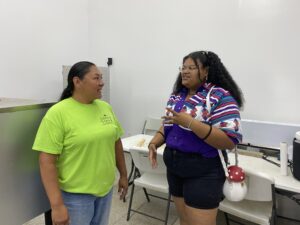
ASPs learn to integrate outcomes from participant evaluations and KI evaluations of their delivery of workshops into curricula to improve after Community Workshop Series one and two. Committees meet after each year of workshops to make improvements to curricula. Additional traditional ecological knowledge gained from workshop participants is added to curricula.
17
32
2
October 31, 2024
In Progress
Farm staff at St. Regis Mohawk Tribe received a summary of participant responses from their Tomato Series Workshop prepared by Crystal Stewart (Cornell). The new Farm Manager, Emma Phillips, plans to integrate this feedback into future workshop offerings.
KIs met after each day of the November 2023 workshops to integrate information and feedback shared the day prior. The feedback on the back-to-back irrigation TTT & Comm workshops included considering a buffer time of at least 1-2 days for integration and preparation. The length of the buffer will be indirectly proportional to the comfort level trainers have with the content and the intended audience members.
Tribal ASPs reported increased comfort with engaging workshop participants before, during, and after workshops. The tools gleaned from this project equipped Tribal ASPs with confidence in participant feedback gathering and analysis.
ASPs expand capacity by providing ongoing technical assistance to Tribal farmers with support from KIs and in the process will sharpen their record keeping skills by documenting the number of farmers beginning or expanding sustainable agriculture projects.
40
17
11
7
October 31, 2024
In Progress
All Tribal ASPs began developing community outreach projects to carry forward skills and relationships gained during the project period. Saint Regis Mohawk Tribe in particular has leveraged this project into a community outreach program and established a community garden space with raised beds at waist level to cater to elders. Eleven Tribal farmers participated in their community garden program during 2024 and learned to grow a variety of traditional and contemporary crops. The program is expanding this year with an equipment loan program so farmers can learn how to operate equipment at the St. Regis Mohawk Tribe's farm and bring it home to apply on their own farms. This project is currently funded and set to continue for the next two years.
100 Tribal farmers will express an increase in confidence, knowledge, and/or skills related to the subject matter of each workshop.
100
32
2
October 31, 2024
In Progress
Tribal farmers in each community benefited from the Community Workshop Series. As a result, each farm reported increased community engagement and participation in online and in-person events and programs. A total of 32 farmers participated in Community Workshops across the project period.
Five farmers surveyed said they gained useful information about growing and canning tomatoes at the SRMT Tomato Series.
SRMT in 2024 will be shifting from a focus on market production to providing technical assistance to community farmers. SNI has already built out some of these services and currently offers a pH kit to assist with basic soil testing and is providing on-the-ground technical assistance to community members via the garden tilling program and informal one-on-one interactions. Food preservation is another area where SNI may become a hub of TA in the community as their cannery, situated on the farm, is soon to open.
SRMT provided a summer garden program that provided in-depth seasonal education to 11 farmers in their community. This program is set to expand and continue in 2025.
Milestone activities and participation summary
Educational activities and events conducted by the project team:
Participants in the project’s educational activities:
Learning Outcomes
An important verified change in knowledge is within the partner organizations who gained important insights into Tribal Nation enterprise farm operations and the opportunities and challenges they face. These insights will continue to guide their outreach and service delivery to Indian Country beyond the end of the project. Methods used to collect learning outcome data primarily relied on verbal sharing in conversation. This approach provided a casual space for partners to volunteer their learning outcomes and progress in this important area.
Tribal farm staff learned adult education topics, such as lesson design, comprehension check-ins, and evaluation methods. Farm staff demonstrated adopting these skills by deploying them in their community workshop series.
Performance Target Outcomes
Performance Target Outcomes - Service Providers
Target #1
17
17 Tribal farm staff will participate in train-the-trainer workshops and expand their capacity as agriculture service providers by developing culturally-relevant curricula on five topics and delivering 36 workshops in six Tribal Nations. They will also develop close working relationships with Cornell Extension and Maine Organic Farmers an Gardeners Association.
150
150 small Tribal subsistence and direct-market farms will be served by this project, bolstering food sovereignty and access within Tribal Nations.
25
34
44
- 5 Workshops/field days
Tribal Farm staff and KIs cooperated to develop Train-the-Trainer workshops in topic areas relevant to Tribal Nation farming communities. The curricula were adapted to represent commonly grown foods, such as Tuscarora White Corn, and practices, such as food preservation of corn. This exchange of knowledge built trust between the two groups and led to broader positive impacts. For example, Elizabeth Buck of Cornell Extension will apply what she learned to a leadership team within her organization to improve service design and delivery to Indian Country. Tribal Farm staff now have clear communication channels with partner organizations and have gained useful tools for gauging participant comprehension and comfort with the materials.
Performance Target Outcomes - Farmers
Target #1
40
40 Tribal subsistence and direct market farmers will begin or expand a sustainable agriculture project as a result of attending a community class.
The appropriate scale would be number of families engaged in farming for subsistence or direct-market sales: 150.
18
28
The community workshops on irrigation included considerations for design, assembly, and troubleshooting irrigation systems. 18 drip irrigation kits were distributed to participants to use on their farms.
Additional Project Outcomes
Saint Regis Mohawk Tribe received an Administration for Native Americans grant to continue sustainable agriculture outreach and education within their Tribal Nation, focusing on establishing a learning garden where participants grow crops on-site with monthly workshops to assist new farmers along their journey. The project continues relationships made with other Tribal Nations and Cornell Cooperative Extension that resulted from this SARE Project.
Elizabeth Buck of Cornell Extension will apply what she learned about Tribal farm operations, priorities, and community engagement to a leadership team within her organization to improve service design and delivery to Indian Country.
